虚拟语气与推测语气共30页
虚拟语气公开课全PPT课件(模板)

80%
例句
If I were you, I would study harder.(如果我是你,我会ቤተ መጻሕፍቲ ባይዱ努 力学习。)
过去时条件句虚拟语气
基本结构
If + 主语 + had + 过去分词, 主语 + would/should/could/might + have + 过去分词
03
情态动词的疑问句形 式错误
在构成疑问句时,应将情态动词放在 句首,而不是将助动词“do”放在句 首。例如,“你能来吗?”应表达为 “Can you come?”,而不是“Do you can come?”。
THANK YOU
感谢聆听
虚拟语气在从句中的运用技巧
名词性从句中虚拟语气使用规则
虚拟语气在主语从句中的应用
当主语从句表达的是与现在事实相反的情况时,谓语动词用一般过去时。
虚拟语气在宾语从句中的应用
当宾语从句表达的是与现在事实相反的情况时,谓语动词用一般过去时或过去完成时。
虚拟语气在表语从句和同位语从句中的应用
当这些从句表达的是与现在事实相反的情况时,谓语动词用一般过去时。
定语从句中虚拟语气使用规则
虚拟语气在定语从句中的应用:当定语从句表达的是与现在事实 相反的情况时,谓语动词用一般过去时或过去完成时。
需要注意的是,定语从句中的虚拟语气通常出现在“as if”或 “as though”引导的从句中。
状语从句中虚拟语气使用规则
虚拟语气在条件状语从句中的应用
当条件状语从句表达的是与现在事实相反的情况时,谓语动词用一般过去时或过去完成 时。
高中英语之虚拟语气详细讲解
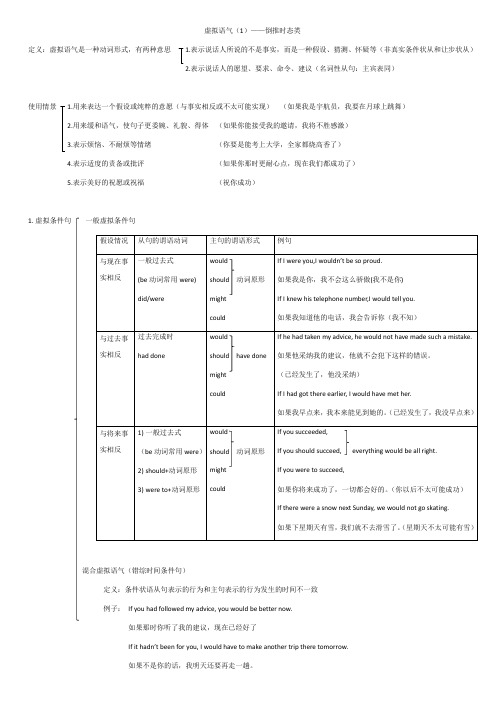
虚拟语气(1)——倒推时态类定义:虚拟语气是一种动词形式,有两种意思 1.表示说话人所说的不是事实,而是一种假设、猜测、怀疑等(非真实条件状从和让步状从)2.表示说话人的愿望、要求、命令、建议(名词性从句:主宾表同)使用情景 1.用来表达一个假设或纯粹的意愿(与事实相反或不太可能实现)(如果我是宇航员,我要在月球上跳舞)2.用来缓和语气,使句子更委婉、礼貌、得体(如果你能接受我的邀请,我将不胜感激)3.表示烦恼、不耐烦等情绪(你要是能考上大学,全家都烧高香了)4.表示适度的责备或批评(如果你那时更耐心点,现在我们都成功了)5.表示美好的祝愿或祝福(祝你成功)1.虚拟条件句一般虚拟条件句混合虚拟语气(错综时间条件句)定义:条件状语从句表示的行为和主句表示的行为发生的时间不一致例子:If you had followed my advice, you would be better now.如果那时你听了我的建议,现在已经好了If it hadn’t been for you, I would have to make another trip there tomorrow.如果不是你的话,我明天还要再走一趟。
If you had studied hard before,you would be a college student now.如果你以前努力学习的话,你现在就是大学生了。
省略+倒装当虚拟条件句的谓语动词中含有were,should,had时,if可以省略,并将were,should,had提前于句首,变为倒装句。
如果虚拟条件句是否定句,not 保留在原处If he should agree to go there, we should send him there.= Should he agree to go there,we should send him there.If she were there,she would agree with us.= Were she were, she would agree with us.If he had learnt about computers,we would have hired him.= Had he learnt about computers,we would have hired him.含蓄虚拟条件句定义:有时为了表达的需要,在虚拟语气中并不总是出现if引导的条件状语从句,而是通过其他手段来代替条件从句分类:1) but for....=(If it+be not for) ;without;Without your help ,we couldn’t have finished the work ahead of time.= But for your help,we couldn’t have finished the work ahead of time.= If it hadn’t been for your help,we couldn’t have finished the work ahead of time.没有你的帮助,我们不可能完成任务。
虚拟语气用法总结及详细解析
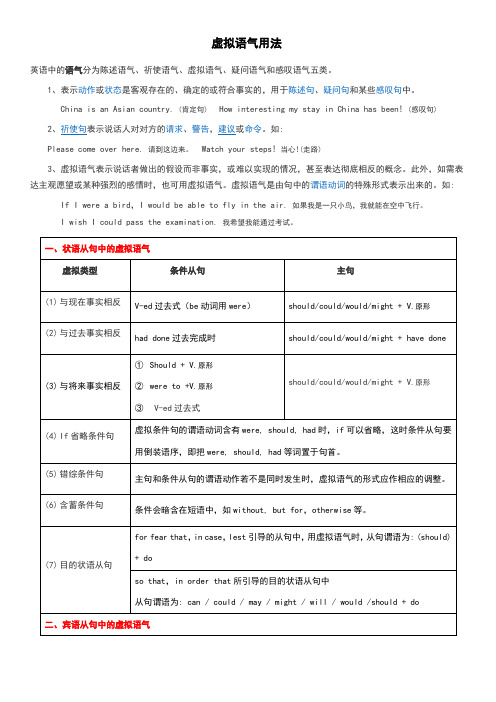
虚拟语气用法英语中的语气分为陈述语气、祈使语气、虚拟语气、疑问语气和感叹语气五类。
1、表示动作或状态是客观存在的、确定的或符合事实的,用于陈述句、疑问句和某些感叹句中。
China is an Asian country. (肯定句) How interesting my stay in China has been! (感叹句)2、祈使句表示说话人对对方的请求、警告,建议或命令。
如:Please come over here. 请到这边来。
Watch your steps! 当心!(走路)3、虚拟语气表示说话者做出的假设而非事实,或难以实现的情况,甚至表达彻底相反的概念。
此外,如需表达主观愿望或某种强烈的感情时,也可用虚拟语气。
虚拟语气是由句中的谓语动词的特殊形式表示出来的。
如: If I were a bird,I would be able to fly in the air. 如果我是一只小鸟,我就能在空中飞行。
I wish I could pass the examination. 我希望我能通过考试。
If there were a heavy snow next Sunday, we would not go skating. 如果下周日下大雪,我们就不能去滑冰了。
If she were to be here next Monday, I would tell her about the matter.如果她下周一来这儿的话,我就会告诉她这件事的始末。
4、有时,虚拟条件句中,结果主句和条件从句的谓语动作若不是同时发生时,虚拟语气的形式应作相应的调整。
这种条件句叫错综条件句。
①从句的动作与过去事实相反,而主句的动作与现在或现在正在发生的事实不符。
If I had worked hard at school, I would be an engineer, too.如果我在学校学习刻苦的话,我现在也会成为一个工程师了If they had informed us, we would not come here now. 如果他们通知过我们的话,我们现在就不会来这里了。
完整版)虚拟语气用法归纳

完整版)虚拟语气用法归纳虚拟语气是动词的一种形式,表示说话人对某一行为或事情的看法和态度。
语气的种类包括陈述语气、祈使语气和虚拟语气。
陈述语气用于陈述句、疑问句和某些感叹句,表示动作或状态是现实的、确定的或符合事实的。
例如:“XXX.”,“XXX?”和“How good a teacher she is!”祈使语气表示说话人对对方的请求或命令。
例如:“Never be XXX!”和“Don’t et to turn off the light.”虚拟语气表示动作或状态不是客观存在的事实,而是说话人的主观愿望、假设或推测等。
例如:“If I were a bird。
I could fly in the air.”,“I wish I could pass the XXX.”和“May you succeed!”在简单句中,虚拟语气常用于情态动词的过去式用于现在时态时,表示说话人的谦虚、客气、有礼貌、或委婉的语气,常用于日常会话中。
例如:“XXX to show me the way to the post office?”和“It would be better for you not to stay up too late.”虚拟语气还可以用于表达祝愿,常用“may+动词原形”表示。
例如:“May good luck be yours!”,“May you be happy!”和“May you do even better!”。
还可以用于表达愿望和建议。
例如:“If only XXX.”和“XXX.”如果我现在有时间,我会和他们一起去。
(陈述语气)如果我现在是你,我就会和他们一起去。
(虚拟语气)与过去事实相反:若与过去事实相反,条件从句的谓语用过去完成时(be动词用had been),主句谓语用“should (would。
could。
might)+have+过去分词”。
如:如果我昨天有时间,我就和他们一起去了。
高中英语 module 5 unit 15 第一第二第三条件句(虚拟语气)综合讲解 北师大版必修5

w_o_u_ld__b_e__h_a_v_in_g_ supper at home now.
第二十四页,共30页。
综合练习3: Multiple Choice
• If the earth _w__e_r_e_t_o_s__to_p(stop) turning, what _____w__o_u_l_d_h_a_p_(pheanppen)?
时 间 If条件句谓语动词 主句谓语动词
将来
一般过去时 (be 动词 用were)
were to do should do
• If there __h_a_d_n_o_t_b_e_e_n_(be) the Communist Party(共产党), there would not have been the foundation of New China.
• If China had not opened to the world, we w__o_u_ld__le_a_d__ (lead) a poor life now.
高中英语 module 5 unit 15 第一第二第三 条件句(虚拟语气)综合讲解 北师大版
必修5
15.05.2023
生产计划部
第一页,共30页。
• 英语中 • 的语气
陈பைடு நூலகம்语气
祈使语气
虚拟语气
第二页,共30页。
If I were a bird,
I would ….
freely
第三页,共30页。
would should could
虚拟语气完整课件

在宾语从句中的使用
01
在某些动词后的宾语从句中,需 要使用虚拟语气,如suggest、 propose、demand等。
02
虚拟语气在宾语从句中的形式与 条件状语从句中的形式相同,根 据所表示的时间不同,使用不同 的动词形式。
在主语从句中的使用
在主语从句中,有时需要使用虚拟语 气,尤其是表示建议、要求、命令等 含义的主语从句。
07
CATALOGUE
虚拟语气在英语口语中的应用
在日常对话中的应用
日常建议
在给朋友提供建议时,可以使用 虚拟语气来表达更委婉的建议,
例如“If I were you, I would consider postponing the meeting.”
礼貌拒绝
当需要拒绝对方请求时,可以使用 虚拟语气来表达更加委婉的语气, 例如“I wish I could help you, but I'm afraid I can't.”
在虚拟语气中,如果所描述的情况是与将来事实相反的,那么条件句可以使用would+动词原形,主句使用 would+动词原形。例如:“If you would come tomorrow, we would have the meeting.”
混合虚拟语气
总结词
表示与过去、现在或将来事实相反的情 况
VS
,提高自己的语法运用能力。
06
CATALOGUE
虚拟语气在英语写作中的应用
在议论文中的应用
要点一
总结词
在议论文中,虚拟语气常用于表达假设条件或个人观点, 强调与事实相反的情况。
要点二
详细描述
在议论文中,作者可以使用虚拟语气来提出与现实相反的 情况,以强调自己的观点或反驳对方的观点。例如,“假 如没有环保法规,环境将遭受更严重的破坏。”通过使用 虚拟语气,作者能够更清晰地表达自己的立场和论点。
虚拟语气大全PPT

05
虚拟语气的常见错误
时态错误
总结词
时态错误是虚拟语气中常见的错误之 一,主要表现在时态与虚拟场景不匹 配。
详细描述
在虚拟语气中,时态应与虚拟场景相 符合。例如,在表示与现在事实相反 的虚拟场景时,应使用一般过去时, 而不是一般现在时。
语气词错误
要点一
总结词
语气词错误是指在使用虚拟语气时,语气词的选择不正确 。
虚拟语气在省略句中的用法
虚拟语气在if省略句中的用法
在if省略句中,如果条件状语从句中有were、had、should等词,可以省略if,并把were、had、should等词放 在句首。
虚拟语气在倒装句中的用法
在虚拟语气中,有时需要将谓语动词提前构成倒装句,以强调语气。例如,Were it not for your help, I would not have succeeded.
答案及解析
had read
解析
此题考查虚拟语气中的“if only”结构,表示“要是…… 就好了”。根据句意,应该使用过去完成时表示与过去事 实相反的情况。因此,答案为“had read”。
翻译题练习
翻译题1
如果我是你,我就会去参加那个 聚会。
答案及解析
If I were you, I would go to the party.
06
虚拟语气练习题及解析
选择题练习
选择题1
If it were not for the fact that I _______ busy, I would go with you.
答案及解析
A. am B. were C. will be D. have been
解析
(完整版)虚拟语气详解
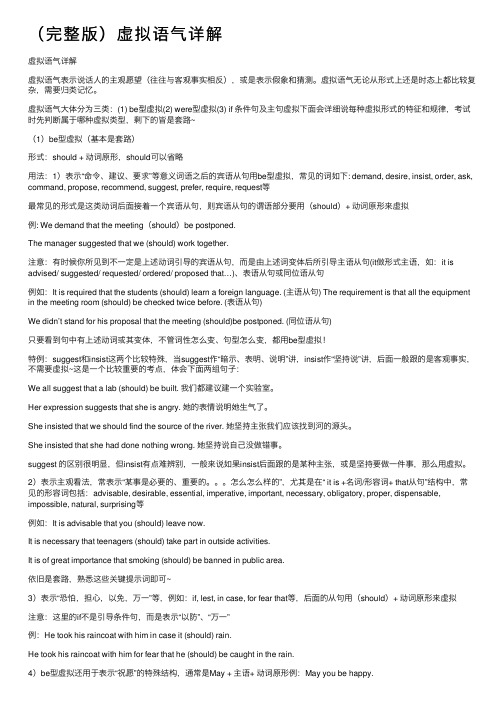
(完整版)虚拟语⽓详解虚拟语⽓详解虚拟语⽓表⽰说话⼈的主观愿望(往往与客观事实相反),或是表⽰假象和猜测。
虚拟语⽓⽆论从形式上还是时态上都⽐较复杂,需要归类记忆。
虚拟语⽓⼤体分为三类:(1) be型虚拟(2) were型虚拟(3) if 条件句及主句虚拟下⾯会详细说每种虚拟形式的特征和规律,考试时先判断属于哪种虚拟类型,剩下的皆是套路~(1)be型虚拟(基本是套路)形式:should + 动词原形,should可以省略⽤法:1)表⽰“命令、建议、要求”等意义词语之后的宾语从句⽤be型虚拟,常见的词如下: demand, desire, insist, order, ask, command, propose, recommend, suggest, prefer, require, request等最常见的形式是这类动词后⾯接着⼀个宾语从句,则宾语从句的谓语部分要⽤(should)+ 动词原形来虚拟例: We demand that the meeting(should)be postponed.The manager suggested that we (should) work together.注意:有时候你所见到不⼀定是上述动词引导的宾语从句,⽽是由上述词变体后所引导主语从句(it做形式主语,如:it is advised/ suggested/ requested/ ordered/ proposed that…)、表语从句或同位语从句例如:It is required that the students (should) learn a foreign language. (主语从句) The requirement is that all the equipment in the meeting room (should) be checked twice before. (表语从句)We didn’t stand for his proposal that the meeting (should)be postponed. (同位语从句)只要看到句中有上述动词或其变体,不管词性怎么变、句型怎么变,都⽤be型虚拟!特例:suggest和insist这两个⽐较特殊,当suggest作“暗⽰、表明、说明”讲,insist作“坚持说”讲,后⾯⼀般跟的是客观事实,不需要虚拟~这是⼀个⽐较重要的考点,体会下⾯两组句⼦:We all suggest that a lab (should) be built. 我们都建议建⼀个实验室。
虚拟语气与推测语气
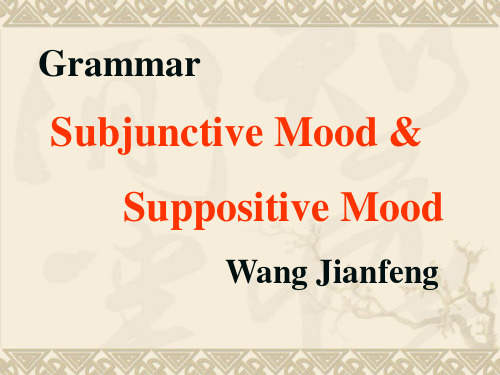
二、用在主语从句中 (用should + do, should可省略) • It is + important (necessary, natural, strange,) + that从句 • It is a pity (a shame, no wonder) + that从句 • It is suggested (decided, ordered, demanded, required) + that从句 例: *It is necessary that we should clean the room every day. *It was a pity that you be so careless. *It will be suggested that she should finish her homework this afternoon.
注 2、表示对将来的假设,如果假设有可能成为 现实,或者实现的可能性很大,则我们不用虚 拟语气,而用陈述语气。即在条件状语从句或 时间状语从句中,我们用一般现在时代替一般 将来时。例如: When he comes, I will tell him everything I know. (时间状语从句) If it is fine tomorrow, all of us will go to the countryside to have a picnic.(条件状语从句)
3.Jane’s pale face suggested that she ___ill, and her parents suggested that she___ a medical examination. B A.be; should have C.should be; had B.was; have D.was; hassome of the sun’s heat, the earth at night ___ ,too cold for us to live. A A.would be freezing cold C.would be frozen cold B.will be freezing coldly D.can freeze coldly
虚拟语气及情态动词表推测
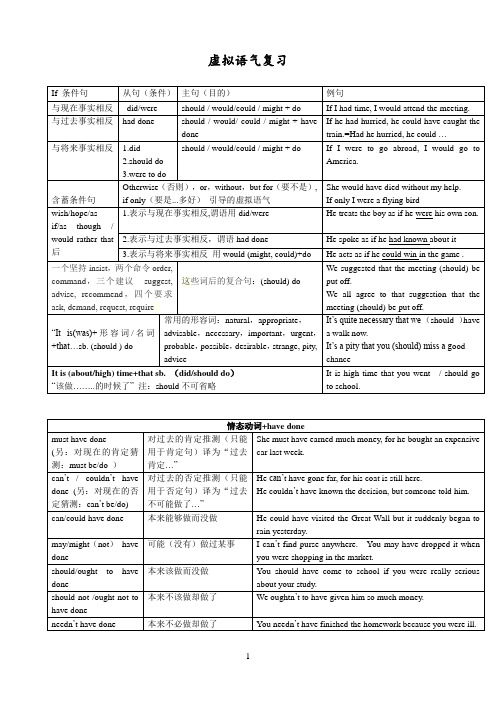
虚拟语气复习If 条件句从句(条件)主句(目的)例句与现在事实相反did/were should / would/could / might + do If I had time, I would attend the meeting.与过去事实相反had done should / would/ could / might + havedone If he had hurried, he could have caught the train.=Had he hurried, he could …与将来事实相反 1.did2.should do3.were to do should / would/could / might + do If I were to go abroad, I would go toAmerica.含蓄条件句Otherwise(否则),or,without,but for(要不是),if only(要是...多好)引导的虚拟语气She would have died without my help.If only I were a flying birdwish/hope/asif/as though / would rather that 后1.表示与现在事实相反,谓语用did/were He treats the boy as if he were his own son.2.表示与过去事实相反,谓语had done He spoke as if he had known about it3.表示与将来事实相反用would (might, could)+do He acts as if he could win in the game .一个坚持insist,两个命令order,command,三个建议suggest, advise, recommend,四个要求ask, demand, request, require 这些词后的复合句:(should) doWe suggested that the meeting (should) beput off.We all agree to that suggestion that themeeting (should) be put off.“It is(was)+形容词/名词+that…sb. (should ) do 常用的形容词:natural,appropriate,advisable,necessary,important,urgent,probable,possible,desirable,strange, pity,adviceIt’s quite necessary that we (should )havea walk now.It’s a pity that you (should) miss a g oodchanceIt is (about/high) time+that sb. (did/should do)“该做……..的时候了”注:should不可省略It is high time that you went / should go to school.情态动词+have donemust have done(另:对现在的肯定猜测:must be/do )对过去的肯定推测(只能用于肯定句)译为“过去肯定…”She must have earned much money, for he bought an expensivecar last week.can’t / couldn’t have done (另:对现在的否定猜测:can’t be/do) 对过去的否定推测(只能用于否定句)译为“过去不可能做了…”He can’t have gone far, for his coat is still here.He couldn’t have known the decision, but someone told him.can/could have done 本来能够做而没做He could have visited the Great Wall but it suddenly began torain yesterday.may/might(not)have done 可能(没有)做过某事I can’t find purse anywhere. You may have dropped it whenyou were shopping in the market.should/ought to have done 本来该做而没做You should have come to school if you were really seriousabout your study.should not /ought not tohave done本来不该做却做了We oughtn’t to have given him so much money.needn’t have done 本来不必做却做了You needn’t have finished the homework because you were ill.。
虚拟语气ppt课件完整版

02 03
例子
Had you come earlier, you would have met him.(= If you had come earlier, you would have met him.)(如果你早点来,你就能 见到他了。)
例子
Should it rain tomorrow, we would stay at home.(= If it should rain tomorrow, we would stay at home.)(如果明天下雨,我们就 呆在家里。)
虚拟语气用于强调句时,通常是通过 “It was ... that”结构对句子中的特 定成分进行强调。
在这种结构中,虚拟语气的使用与普 通虚拟语气略有不同,需要根据具体 情况进行判断。
虚拟语气与其他语法结构搭配使用
虚拟语气可以与定语从句、状语从句等语法结构搭配使用,表达更为复杂的语义关 系。
在这些结构中,虚拟语气的使用需要根据具体的语境和表达的语义关系进行判断。
真实条件句
表达现实中可能实现的情况, 使用陈述语气。
例子
If you study hard, you will pass the exam.(如果你努力 学习,你会通过考试。)
非真实条件句
表达与事实相反或不太可能实 现的情况,使用虚拟语气。
例子
If I were you, I would not do that.(如果我是你,我不会那
状语从句中虚拟语气使用
在if条件状语从句中
如果条件状语从句所表示的内容与实际情况相反或实现的可能性很小,则从句中的谓语动词常用虚拟语气。
在其他状语从句中
除了if条件状语从句外,还有一些其他状语从句也可以用虚拟语气,如:in order that(为了)、so that(以便 )等引导的目的状语从句中。这些从句中的谓语动词形式通常为“may/might/could/should + 动词原形”。
情态动词表推测和虚拟的用法

情态动词表推测和虚拟的⽤法情态动词情态动词(⼀)表能⼒表现在的能⼒:1. can 2. am/is/are able to表将来的能⼒:will be able to表过去的能⼒:1.could 2. was/were able to 表过去的能⼒并且成功的做了= managed to do sth/ succeeded in doing sth 3. could have done 表过去有能⼒本能做但未做例如:I could have worked out the problem, but I was too nervous.我本来可以解出这道题的,但我太紧张了(⼆)表推测(可能性)1.①客观可能性:说明⼈或事物特征can例句:He ought to/should be here on time-he started early enough.他应该准时到这⼉——他出发得够早的。
(1)肯定句表推测(must/have to, should/ought to, may, might, could)(2)否定句中表推测(m ay not, might not, shouldn’t, can’t, couldn’t)(3)疑问句中表推测(can, could)例句:Could he be serious? 他是认真的吗?3.情态动词+have done⽤法汇总must have done 过去肯定推测can’t /couldn’t have done 过去否定推测can / cannot have done 过去可能推测“可能做了/不可能做了”,其中can have done ⽤于疑问句could / could not have done (1)过去可能或不可能做(表推测)(2)过去本能够做/没做够做(表虚拟)may /may not have done 过去也许已经做了/没做(表推测)如:He may not have finish the work. 他可能没有完成这项⼯作。
虚拟语气讲解(整理)

(3)虚拟语气在 在主语从句中
A.在句型 “It is important (necessary, strange, natural) that .... ” 中,that 后面的从句中的谓语动词 用: should + 动词原形
1. 我们有必要出去散散步。 It’s necessary that we should have a walk now.
2.用于表示命令、建议、要求等一类词后面的宾语从句。 insist, order, command, suggest, advise, propose, require, request, demand, desire etc.
We suggested that the meeting (should) be put off.
7. It is of the utmost importance that you ______ here on time. a. be b. shall be c. are to be d. must be
三、虚拟语气在其他从句中
1. It is (high / about ) time that…从句中的谓 语动词用过去式或should+动词原形,should 不能省略. It is high time that you went / should go to school.
I would rather you told me the truth. I would rather you had gone there last Sunday.
4. as if ( as though) 看起来 常用虚拟形式,即 表示与现在事实相反,用过去式;与过去事实相反 用过去完成式 (had done).
虚拟语气的各种用法
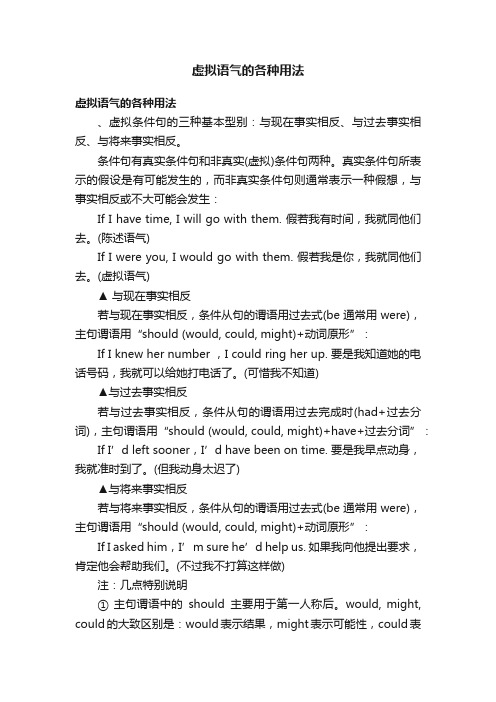
虚拟语气的各种用法虚拟语气的各种用法、虚拟条件句的三种基本型别:与现在事实相反、与过去事实相反、与将来事实相反。
条件句有真实条件句和非真实(虚拟)条件句两种。
真实条件句所表示的假设是有可能发生的,而非真实条件句则通常表示一种假想,与事实相反或不大可能会发生:If I have time, I will go with them. 假若我有时间,我就同他们去。
(陈述语气)If I were you, I would go with them. 假若我是你,我就同他们去。
(虚拟语气)▲ 与现在事实相反若与现在事实相反,条件从句的谓语用过去式(be通常用were),主句谓语用“should (would, could, might)+动词原形”:If I knew her number ,I could ring her up. 要是我知道她的电话号码,我就可以给她打电话了。
(可惜我不知道)▲与过去事实相反若与过去事实相反,条件从句的谓语用过去完成时(had+过去分词),主句谓语用“should (would, could, might)+have+过去分词”:If I’d left sooner,I’d have been on time. 要是我早点动身,我就准时到了。
(但我动身太迟了)▲与将来事实相反若与将来事实相反,条件从句的谓语用过去式(be通常用were),主句谓语用“should (would, could, might)+动词原形”:If I asked him,I’m sure he’d help us. 如果我向他提出要求,肯定他会帮助我们。
(不过我不打算这样做)注:几点特别说明① 主句谓语中的should主要用于第一人称后。
would, might, could的大致区别是:would表示结果,might表示可能性,could表示能力、允许或可能性。
比较:If you tried again ,you would sueed. 要是你再试一试,你就会成功的。
虚拟语气讲解和练习(附答案)
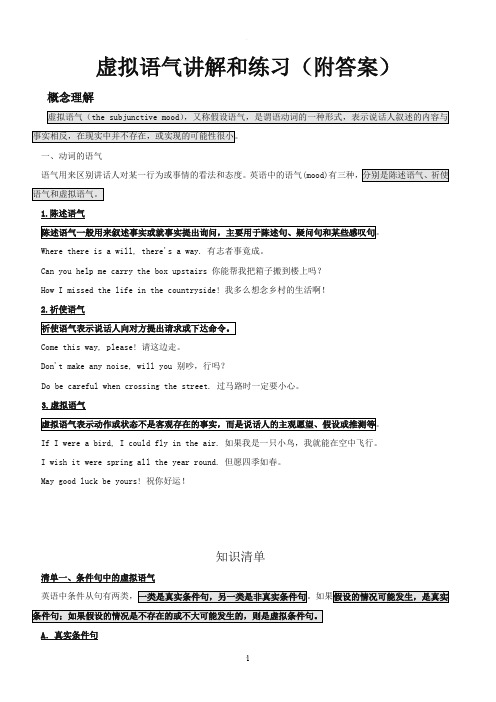
虚拟语气讲解和练习(附答案)概念理解一、动词的语气语气用来区别讲话人对某一行为或事情的看法和态度。
英语中的语气(mood)1.陈述语气Where there is a will, there's a way. 有志者事竟成。
Can you help me carry the box upstairs 你能帮我把箱子搬到楼上吗?How I missed the life in the countryside! 我多么想念乡村的生活啊!2.祈使语气Come this way, please! 请这边走。
Don't make any noise, will you 别吵,行吗?Do be careful when crossing the street. 过马路时一定要小心。
3.虚拟语气If I were a bird, I could fly in the air. 如果我是一只小鸟,我就能在空中飞行。
I wish it were spring all the year round. 但愿四季如春。
May good luck be yours! 祝你好运!知识清单清单一、条件句中的虚拟语气A.真实条件句If he doesn't come at 8, we won't wait for him. 如果他八点不来,我们就不等他了。
If a flood happened in the past, there was usually a great loss of life and property. 过去发生洪水的话,常有很大的生命和财产损失。
We shall go there unless it rains tomorrow. 如果明天不下雨,我们将去那里。
I'll let you use my bike on condition that you keep it clean. 如果你能保持车子干净,我就让你用我的自行车。
推测与虚拟语气
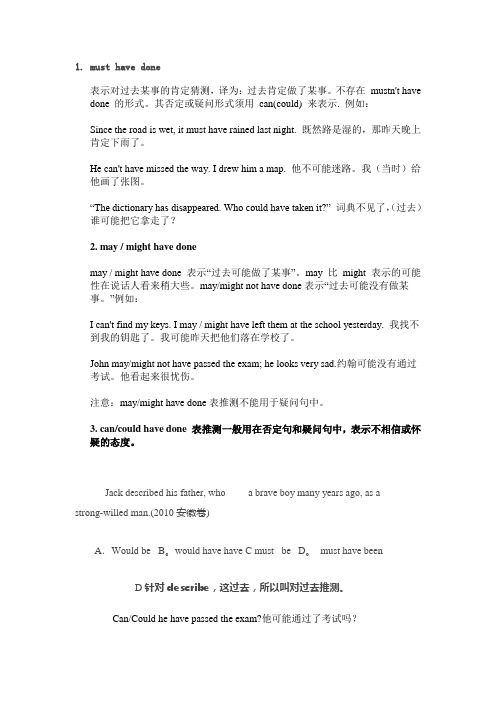
1. must have done表示对过去某事的肯定猜测,译为:过去肯定做了某事。
不存在mustn't have done的形式。
其否定或疑问形式须用can(could)来表示.例如:Since the road is wet, it must have rained last night.既然路是湿的,那昨天晚上肯定下雨了。
He can't have missed the way. I drew him a map.他不可能迷路。
我(当时)给他画了张图。
“The dictionary has disappeared. Who could have taken it?”词典不见了,(过去)谁可能把它拿走了?2. may / might have donemay / might have done表示“过去可能做了某事”。
may比might表示的可能性在说话人看来稍大些。
may/might not have done表示“过去可能没有做某事。
”例如:I can't find my keys. I may / might have left them at the school yesterday.我找不到我的钥匙了。
我可能昨天把他们落在学校了。
John may/might not have passed the exam; he looks very sad.约翰可能没有通过考试。
他看起来很忧伤。
注意:may/might have done表推测不能用于疑问句中。
3. can/could have done表推测一般用在否定句和疑问句中,表示不相信或怀疑的态度。
Jack described his father, who____ a brave boy many years ago, as astrong-willed man.(2010安徽卷)A.Would be B。
表推测与虚拟语气的区别

一、在虚拟语气中的用法1. should have done 表示“过去本应该做某事却未做。
”其否定结构shouldn't have done 表示“过去本不该做某事却做了。
”2. ought to have done 表示“过去本应该做某事却未做。
”其否定结构oughtn't to have done 表示“过去本不该做某事却做了。
”3. need have done 表示“过去本有必要做某事却未做。
”其否定结构needn't have done 表示“过去本没必要做某事却做了。
”4. could (不能用can) have done 表示“过去本能够做某事却未做。
”注意:其否定形式couldn't have done 没有虚拟语气的用法,couldn't have done 只能表推测,相当于can't have done,意为:“过去不可能做了某事。
”5. might (不能用may) have done 表示“过去本可以做某事却未做。
” 注意:其否定形式might not have done 没有虚拟语气的用法,might not have done 只能表推测,相当于may not have done,意为:“过去可能没有做某事。
”二、表推测的用法1. must have done表示对过去某事的肯定猜测,译为:过去肯定做了某事。
不存在mustn't have done 的形式。
其否定或疑问形式须用can(could) 来表示. 例如:Since the road is wet, it must have rained last night. 既然路是湿的,那昨天晚上肯定下雨了。
He can't have missed the way. I drew him a map. 他不可能迷路。
我(当时)给他画了张图。
“The dictionary has disappeared. Who could have taken it?” 词典不见了,(过去)谁可能把它拿走了?2. may / might have donemay / might have done 表示“过去可能做了某事”。
